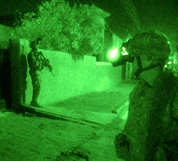
ABOVE: Dubai Court House
According to a recent report in Gulf News, the English-language daily newspaper based in Dubai, a man who was attempting to export zirconium from the UAE was referred to the Dubai court for prosecution.
Judge Esam Eisa Al Humaidan, Attorney General, … told Gulf News the suspect was referred to court last week and a hearing will be held today. He said this is believed to be one of the very few cases of its kind, if not the first ever.
We’ll put our money on “first ever.”
Humaidan, no doubt aware that his country’s first tiny baby-step into the world of export control is being careful watched by certain people at the Department of Commerce, made clear that he’s doing everything he can not to screw it up:
“We have conducted thorough investigation in the case, to guarantee the complete and accurate implementation of the law,” he said. All procedures were done according the highest levels of accuracy, including ordering the arrest of the suspect, searching him, interrogating him and the other witnesses and the examination of the seized metal, he added
We’re not so sure what the “highest levels of accuracy” in interrogation means in the UAE, but we will take the Attorney General at his word and simply hope that the application of water wasn’t involved.
The background to all of this is, of course, an earlier threat by the Department of Commerce to put the UAE on a special list of countries of “diversionary concern,” which would have made exports of dual-use items to the UAE more difficult. The Department later retracted that threat after noting that the UAE had passed a new export law.

 Posted by
Posted by  Category:
Category: 

 According to
According to  Québec’s Commission des droits de la personne et des droits de la jeunesse (“Human Rights Commission”) issued a
Québec’s Commission des droits de la personne et des droits de la jeunesse (“Human Rights Commission”) issued a 
 The Directorate of Defense Trade Controls (“DDTC”) issued today a
The Directorate of Defense Trade Controls (“DDTC”) issued today a 

